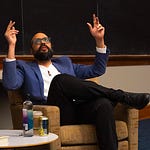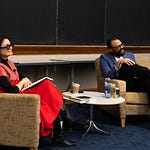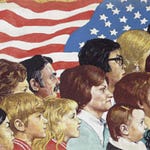If you’ve been listening to Banished, you’ll recall that in just a few short months we’ve talked about attempts to abolish artwork, to repudiate literature and even to eliminate entire curricula throughout the United States. But you may wonder, as I sometimes still do, why me? Why am I, Amna Khalid, pulled toward these topics, compelled by what we casually call “cancel culture”?
And so, dear listeners, it feels like the right time to step back — to give you a sense of who I am and why I am deeply disturbed by the censorship and intolerance now thriving in the West. For this week’s episode, I will read aloud from a letter that I wrote earlier this year, to a loved one with whom I grew up in Pakistan. I hope that I leave you with a better understanding of why this show, why Banished and why me.
Mani,
My darling, darling Mani. What a ways the two of us have come. From the long, lazy days of Ammi’s home-cooked meals and family chatter, with all of us huddled together on her bed in Islamabad, to where we are now: you in the endless grey that runs through your years in Britain, now visible in the hairs on your face; and I enduring my tenth Minnesota winter.
We’ve taken to our new homes — quite seamlessly and effortlessly for the most part. You’ve internalized the sorry-reflex of the Brits and I, as you point out every chance you get, have inadvertently started mimicking the rhotic accent of the Midwest that grates on you so much. And though we never dare to speak of the oceans of losses that we have buried deep within us, you and I both know there is much that we have left behind. The dewy mornings of fall, the warmth of the winter sun, the oppressive dry heat of the summer months and the intensity of the monsoon rains punctuated by days of stifling humidity that would only let up with the next downpour — and the cycle would begin once again.
But that was not the suffocation that you and I ran away from. Our escape, if you will, was from a different kind of claustrophobia. You being gay and unable to live freely in your fullness and write in ways that challenged reigning orthodoxies; and me — then a young woman with too many ideas, hungry for intellectual stimulation, challenging all norms and limitations. Flamboyant and outspoken, we flirted with the idea of crossing the line of what was acceptable, but only in our small social circles of other misfits like you and me.
For me, the closing in of the walls came into focus for the first time that fateful evening in February 1989. I remember we could hear the mob outside the American Cultural Center which was miles away from our house. You turned on the tv and we watched it happen — the riots protesting Salman Rushdie’s Satanic Verses. The streets were teaming with thousands of zealots after Ayatollah Khomeini declared a fatwa against Rushdie — the atmosphere was chilling. I was only 10 then but the gravity of the situation wasn’t lost on me. In the following months we sat night after night watching riots ripple across the globe, for Rushdie had committed blasphemy — (certain) Muslims were offended and their offense was translating into terror and violence.
It was only in the wake of the Rushdie affair that I fully came to appreciate the expansiveness of the notion of blasphemy and the legal infrastructure within Pakistan that gave it teeth. I started reading the newspaper and, of course, it was all too apparent for anyone to see, even to a ten year old, how these blasphemy laws — perverted in their very criminalization of speech to begin with — became a tool for repressing and dispossessing non-muslims. How these developments gave license to the outright targeting of minority groups hit home for me a year later when my friend Asha’s neighbor, an Ahmadi, was shot in his own driveway by a group of vigilantes. As I cast my mind back I can see my dumbstruck eleven-year-old self, holding Asha’s hand in school the next day -- both of us terror-stricken as she recounted how she and her father heard the shots, ran out and then helped load her neighbor’s bleeding body in their car only to have him declared dead when they got to the hospital.
It was around then that I consciously started paying attention to the politics of the times: the misogyny entrenched in the Zina Ordinance that resulted in rape victims becoming criminally liable for offenses against them; the systematic purging of progressive teachers and professors; the ideological tyranny that shaped the curriculum in public schools and universities; media censorship and the erosion of democratic institutions across the board.
Remember when all women newscasters were told they had to cover their heads? And when dance performances were categorized as “obscenity”? Oh and that time when we were walking to Jinnah Market for ice-cream and this man came up to me and told me that I should wear a dupatta? We were both so stunned and frightened that we said “yes” and walked on, neither one of us daring to even comment to each other on the absurdity of what had happened. And how can I forget! The time when some low-ranking mullah declared a fatwa against you for walking into your classroom with a cup of tea in the middle of Ramadan when you were teaching English to 7th graders. You always were absent-minded. That was close — a lucky escape for you that no major media outlet picked it up.
It’s not that I hadn’t felt the suffocation before that. The fateful marriage of religious dogma and political ideology under Zia’s dictatorship birthed the ‘blasphemous mindset’ that permeated all aspects of our lives. I remember in school each time I voiced my inquisitiveness, disapproval awaited me. There was the Pakistan Studies class when I asked about the role of Muslims in the killings of Hindus and Sikhs during the Partition of India; I was shut down and told, “It was they who started the killing, not us.” Once, I dared to wonder out loud if we would have been better off in a joint India and Miss Nosheen gave me a look that sends shivers down my spine even today as I recall it in my mind’s eye. At the next parent teacher meeting my “report card” said: “Amna is intelligent but she asks disruptive questions in class.” And then there was the Islamiat class. Now that’s a boundary that even I knew not to cross — I learned early on, head down and no questions. Genuine, probing questions about Islamic history were actively discouraged. Banish the thought of even a mild challenge to the indoctrination the curriculum engendered.
It wasn’t much better in college for me either. You left in 1993 for the greener pastures of Britain to pursue your MA, but I was still in the thick of finding my way out. I was hoping, naively, that going to a private college would give me the freedom I so desperately craved. In some ways it did, but only because I got savvier at navigating the obstacles. It didn’t take me long to see the shallowness of the seemingly liberal atmosphere of the school. Yes of course, I had inspirational teachers like Khurram, Hasan and Ali, who opened a whole new world for me intellectually — but there was a darker side to it all. While a handful of us were looking to these professors to widen our horizons, a number of other professors were recruiting students into the Tablighi Jamaat. Remember Zain, who was dating my friend Maryam? One day, out of the blue some students invited him for Tablighi sessions at Raiwind. And then one fine morning, Maryam came crying to my dorm room: “He broke up with me — he says dating is anti-Islamic.” And sure enough, two days later he’d changed his entire persona. Just like that, Zain went from being the cool guy who sported stonewash jeans and U2 t-shirts, to growing a beard, wearing shalwar kameez and refusing to make eye contact with women, let alone shaking their hands. And you know what Mani, he wasn’t the only one. It happened to many — much like dominoes falling. From one day to the next another one fell.
I don’t think I ever told you what happened to Asim. Yes, the same Asim whose painting you bought a few years ago. Once in a gender studies class he said something about the unfairness of Islamic law and he was hauled before the college’s disciplinary committee to “educate” him. They almost suspended him for a term but he somehow managed to stay on. And Tahseen, the Pakistani-American professor teaching the course — she was the idealistic sort who returned from the US in the hopes of “giving back” — well, she ended up being forced out by the administration. Teaching Judith Butler in Pakistan — that was her “crime.” At the end of that semester when she told us she’d decided to move back to the US, I offered to help her pack her office. She and I, we both sat on her office floor taping boxes heavy with books, much like our hearts with sadness.
But Mani, as always, I digress. Where was I? Ah yes, the Rushdie affair and what that meant to us. Back then the way the West came to Rushdie’s rescue and scoffed at offense as a rationale for limiting expression was an unexpected comfort. Britain provided police protection for Rushdie and even broke off diplomatic relations with Iran. Imagine that! To live in a place where no one stops you from dressing the way you wanted; no vigilantes telling you what you can or cannot say; where asking questions in class is rewarded not punished; a place where there is no thought police; where the state protects your right to express yourself even if it sours foreign relations — heaven! Just imagining it was delicious and yes, oh so blasphemous!
Now that I cast my mind back it was around then that you and I started dreaming of possibilities elsewhere. We looked to the West and we were tempted — tempted by the promise of freedom. It wasn’t really the freedom to dress how we wanted or to drink openly. It was the freedom to think and speak freely, the freedom to explore ideas and know that we could dare to go wherever they led us. You took off for England and made a new home there; and I true to being the youngest who pushed the limits just a little bit more, followed a few years later but was still restless. Sure enough, after 8 years at Oxford I needed to move on. My adventure of teaching in South Africa lasted two years and I got itchy feet again. And here I am today, in the belly of the beast so to speak — the country that prides itself on free speech as a constitutional right. You couldn’t go wrong — teaching at a small liberal arts college in the US. A place where at last I could be fully free. And what better place than the academy to revel in the freedom to think! I was in heaven; the heaven that I had dreamed of.
But as of late I find myself wondering, am I really? With more than half the states introducing bills that ban what they construe as critical race theory in schools, the specter of state censorship is beginning to make an appearance here too. The threat to academic freedom from right wing political forces has proliferated At two universities governing boards interfered with the selection of university presidents in order to install political allies; there was donor meddling in UNC’s denial of tenure to Nicole Hannah Jones, of the 1619 project fame; and just last week the University of Florida, a public school mind you, banned three professors from serving as expert witnesses in a lawsuit challenging a state law that limits how residents can vote. Who would’ve thought this could happen in America.
When did I first see cracks in my romance with the freedom of the academy in the West? I'd say probably five years into my time in the US. Our college was considering instituting a “bias response team” and out of sheer curiosity I decided to go to the town hall. What are these teams you ask — they are committees of administrators, students and possibly faculty to assess “bias” complaints, which could be filed if anyone or any group of people on campus were offended by anything said or done by others. The case is investigated and the offending party potentially sanctioned. As I sat there listening to this proposal which seemed to me a softer version of speech control, I could feel the hairs on the back on my neck standing. I had a creeping sense that unwritten rules for regulating thinking and speech were rearing their heads in the US too. Couched in terms of being sensitive to others, they reeked of the kind of ideological authoritarianism and the “blasphemy mindset” that you and I thought we’d left behind. Did we move halfway across the world only to find ourselves trapped in another cage?
Surely, no educational institution in the West would entertain a move that would chill speech on campus and was deeply anti-intellectual! But lo and behold — as I started looking into it Mani, these teams were mushrooming on campuses across the country. And sure enough, these teams are stifling speech.
It’s not just college campuses Mani; the authority of “offense” now reigns supreme. It’s everywhere — even art is not protected. In the spring of 2019 I read a news report about how activists clamoring to have the most stunning murals by Arnatoff erased because of his depiction of colonial occupation, the death of Native Americans and slavery. Some even vowed that they will not rest until these murals were permanently destroyed — all because they supposedly offend and “traumatize” indigenous and African American peoples. It chills me to the bone to think of the dogma that is taking root here. I know you’re going to say, it’s just one incident. But — last summer I heard that students at the University of Kentucky are protesting the Rice O’Hanlon murals on their campus. And students at the Vermont Law School are clamoring to cover The Underground Railroad, Vermont and the Fugitive Slave -- murals made expressly to recognize Black Americans and Vermont abolitionists involved in helping enslaved people who escaped from the South. Why? Because they believe that such painful reminders of slavery should not be in a public setting. No matter the artist was intending to subvert the dominant tropes of manifest destiny by placing Native Americans, African Americans and even working class revolutionaries at the center of these paintings. The contagion of intolerance spreads fast I suppose.
What have things come to? As if there is a predetermined way of interpreting art! As if Native Americans or African Americans have a singular sensibility! Reminds me of how people here like to box Muslims — as if all 2 billion of “us” are the same! Oh how I tire here of the likes of Sam Harris who portray every Muslim woman who comes to the West as an Ayan Hirsi Ali, an ex-Muslim who has successfully escaped the shackles of Islamic regimes. How people simplify things, seduced by the narrative of the West saving Muslim women from the “cruelties” of Islam. The other day someone said to me, “How fortunate you must feel that you are no longer in Pakistan! I take it you don’t see yourself as Muslim?” My response: “I’m only an ex-Muslim in Pakistan; in the US I am always a Muslim — and by choice.” I left him standing there, baffled.
Fortunate. Yes, that’s what we thought we were when we first came to our new homes. Few can see the warp and woof of loss and grief that’s woven into the very fabric of our fortunes. Even I did not fully realize the granularity and texture of the heartbreak that our freedom entailed. The sadness of leaving family behind, though always present, only struck me in its fullness when I decided to make my own. I remember telling daddy on the phone that I was pregnant — his boundless joy traversed the thousands of miles between us and spilled out on this end of the telephone. As I clumsily navigated both the flutters of excitement and backbreaking pains of my growing belly, I ached for the mother-daughter intimacy that so many of our cousins back home took for granted when they had their first borns. I wished Ammi could be there to hold my hand and guide me into motherhood. But it was daddy’s unexpected death just a couple of months after Ravi’s birth — the rush of unbridled grief of losing a parent colliding with the limitless and exhilarating joy of becoming one — that’s what drove home to me the immeasurability of the cost of leaving home. How much we have surrendered just to speak and think freely!
Here I go digressing again. Back to the tyranny of “social justice” as they call it — what a perversion of the term. Of course I know all about the horrors of racism and sexism — how could I not. As a postcolonial subject growing up with the vile legacy of colonialism that infects so much in Pakistan, and later a woman navigating a society suffused with violent patriarchy I do understand! But the “social justice” of the West strikes me now as anti-social and no longer just. This will truly pain you, Mani, but there’s even a movement to read literature through a “social justice” lens. Turns out the literary canon is “for white people, by white people and about white people.” Shakespeare’s stature in the canon is reduced to “white supremacy and colonization.” Why then did I find myself both despising and feeling for Shylock when he asks for a pound of flesh and loses his case? Why then did Hamlet’s soliloquy speak to me in moments of existential crises back in Pakistan? What’s more, universities are closing Classics departments; professors from within the field themselves are asking for its demolition because white supremacy is believed to “reside in the very marrow of the classics.” I tell you Mani, even words have lost their meaning — “white supremacy,” “racism” —they no longer mean what they used to.
I worry for Ravi and Sahil too. I know, I know they are only 9 and 6. But Mani, there are primers for teachers out there — mind you they are well regarded by many — on how to “dismantle racism” in math instruction. They preach that a focus on the right answer and asking students to “show their work” are manifestations of “white supremacy culture.” Just a couple of months ago Dr. Seuss’s estate announced that six of his books will no longer be published because of their “hurtful and wrong” racial representations. And sure enough a whole slew of local libraries are now busy pulling them off their shelves. But David Pilkey is the epitome — yes, Pilkey of Captain Underpants fame, he canceled one of his own books in anticipation of possible offense-- a preemptive strike of sorts (Americans seem to be good at those). In his note of retraction, he regrets the “passive stereotypes and racism” that were “harmful to everyone.” It’s surreal — happenings from a dystopian novel.
Ah what a long way you and I have come from a country where writers were canceled by diktat of blasphemy. And yet, have we really? Here I am in a country that I call home where authors no longer have to be sanctioned by others; they cancel themselves. And you are in a country where school teachers are fired for offending Muslim sensibilities for showing cartoons of Mohammad in a class on religion and free expression. Oh the irony that this should be happening in Britain, the very country that provided refuge to Rushdie in the wake of the Satanic Verses affair. The West, once that shining beacon of freedom for us, seems a lot less lustrous from where we sit now. Censorship predicated on offense, once seen as the hallmark of “backward” cultures of the third world, appears to be a virtue of progressive thinking today.
Sometimes I wonder Mani, maybe we were the real blasphemous ones for daring to hope and imagine that heaven could in fact be a place on earth. And now, perhaps this is our atonement — for what can be heavier than the weight of disillusionment?
Your sad and despondent Amna














Share this post